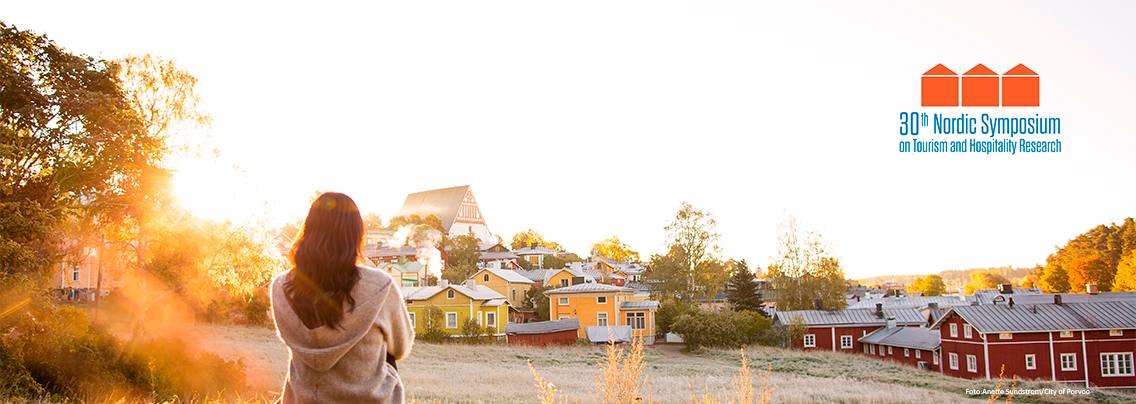
Raija Komppula
Chair of the Scientific Committee
Professor, University of Eastern Finland
Raija Komppula is Professor of Marketing, especially Tourism Business, at the University of Eastern Finland, Business School. Her research interests include research on tourist experience, customer involvement in new service development in tourism, destination branding, market orientation, small business research and entrepreneurship, cooperation and networks. She has conducted research on these topics especially in the context of nature based and rural tourism, and recently in wellbeing and social tourism. Professor Komppula has several positions of trust in tourism industry in Finland, and she is member of AIEST, TRC (Tourist Research Center) and ISTO.

Jarkko Saarinen
PhD School
Professor, University of Oulu
Jarkko Saarinen is Professor of Human Geography at the University of Oulu, Finland, and Visiting Professor at the Uppsala University, Sweden. His research interests include regional and local development, sustainability in tourism, tourism and climate change, resilience studies, tourism-community relations, and nature conservation studies. Jarkko has supervised over 25 PhD dissertations in Finland, New Zealand and South Africa, and he has examined over 35 PhD dissertations. He is Editor for the Tourism Geographies and Associate Editor for the Annals of Tourism Research. His recent publications include co-authored and co-edited books: Climate Change and Tourism in Southern Africa (2022, Routledge); Tourism, Change and the Global South (Routledge, 2021); Resilient Destinations (2019, Routledge); and Borderless Worlds for Whom? (2019, Routledge).

Scott McCabe
Professor of Marketing and Tourism, Nottingham University Business School, Jubilee Campus and Professor of Tourism Marketing/Management, University of Eastern Finland Business School, Joensuu campus, Finland.
Scott McCabe is Professor of Marketing and Tourism at the Nottingham University Business School, where he currently holds the role of Associate Dean for Research and Knowledge Exchange. He is the co-Editor in Chief of Annals of Tourism Research and Annals of Tourism Research Empirical Insights. Scott’s research is primarily on tourist consumer behaviour and tourist decision-making, pro-social and responsible and ethical consumption, social equity and access to participation in tourism for all.
Course information
Thinking Relevancy in Tourism and Hospitality Research
Nordic Doctoral Intensive Course
Monday 26 Sept at 10.00 – Tuesday 27 Sept at 11.00
Address: Haaga-Helia University of Applied Sciences, Porvoo Campus, Taidetehtaankatu 1, 06100 Porvoo, Finland
Course Lecturers: Professor Jarkko Saarinen (coordinator), University of Oulu, Finland; Professor Scott McCabe, University of Nottingham, UK, and; Professor Raija Komppula, University of Eastern Finland)
There is a long tradition of thinking about the relevancy of tourism and hospitality research. Initially, discussions on the relevancy were largely related to the capacity of scholars to serve the industry and its growth needs by producing relevant applied information. Later this economic and industry-oriented focus was complemented by societal and critical perspectives calling for the analyses involving also the environmental and social costs of tourism growth. In addition to the societal relevancy, there has been an increasing emphasis on the academic relevancy of tourism and hospitality research in the past two decades. This search for academic relevancy has highlighted the need for conceptual clarity and theoretical development needs in the research field. In addition to the increasing number of theoretical contributions and connections with social theory, for example, the quest for academic status among disciplines has been demonstrated in numerous bibliometric analyses or graphic reviews of the key scholars and/or core issues and sites of the international tourism and hospitality research.
The calls for societal and academic relevancy are not excluding each other. On the contrary. The tourism and hospitality sectors are currently facing many challenging transformational elements, such as climate change and related carbon neutrality policies, increasing inequalities and social and economic sustainability needs, changing social media, growing international competition on capital, customers and university students, and the ongoing COVID-19 and coming post-pandemic resilience-building needs. All these change factors are calling for academic and societal relevancy and improved knowledge dissemination in tourism and hospitality research that would lead the industry and other stakeholders in development towards ‘desirable futures’. This is also the aim and focus of the 30th Nordic Symposium on Tourism and Hospitality Research.
There are increasing needs for critical thinking, self-reflection and new theoretical, conceptual, methodological, and applied approaches within tourism and hospitality research. This Nordic Doctoral Intensive Course focuses on the relevancy aspects in tourism and hospitality research. The overall aim is to encourage doctoral students to reflect on, justify and hopefully develop the academic and/or societal relevancy of their doctoral research in a student-centric way. The purpose is to encourage thinking and discussions on the relevancy in tourism and hospitality research, in general, and specifically in the students’ PhD research projects. The course will consist of opening notes given by invited scholars and presentations/discussions by PhD students. Students will present and discuss their work in progress by focusing on the selected aspects of academic and/or societal relevancy in their research. Active participation at the Graduate School Course equals 2 ECTS points.
Instructions:
Each Ph.D. presentation takes 15 minutes, followed by 5 minutes for questions and answers. There is also a general discussion time reserved after each session. The presenters are encouraged to discuss the relevancy (academic and societal) aspects of their doctoral research. Each presentation should include a final slide that summarizes the key and critical aspects of academic and societal relevancy of the presenter’s doctoral research: e.g., why this topic and approach are academically relevant in the doctoral researcher’s disciplinary field(s); why his topic and approach are societally relevant; and what academic and societal relevancy the expected results may have? The relevancy aspects and needs can also be discussed critically with an active search for alternative ways to justify research in tourism and hospitality.
There are pre-reading materials listed that aim to help to consider the relevancy aspects. The course language is English.
Pre-reading:
Brauer, R., Dymitrow, M., & Tribe, J. (2019). The impact of tourism research. Annals of Tourism Research, 77: 64-78. https://doi.org/10.1016/j.annals.2019.05.006
Bublitz et al. 2021. Rise up: understanding youth entrepreneurs and their ecosystems. Journal of Public Policy & Marketing, Vol. 40(2), 206-225. https://journals.sagepub.com/doi/full/10.1177/0743915620937702
Cohen, S., Stienmetz, J., Hanna, P., Humbracht, M., & Hopkins, D. (2020). Shadowcasting tourism knowledge through media: self-driving sex cars?. Annals of Tourism Research, 85, 103061.
Cole, S., Wardana, A., & Dharmiasih, W. (2021). Making an impact on Bali’s water crisis: Research to mobilize NGOs, the tourism industry and policy makers. Annals of Tourism Research, 87, 103119.
Mende, M. & Scott M.L. 2021. May the Force Be with you: Expanding the Scope for Marketing Research as a force for Good in Sustainable World. Journal of Public Policy & Marketing, Vol. 40(2), 116-125.
Saarinen, J. (2019). Not a Serious Subject?! Academic Relevancy and Critical Tourism Geographies. In Muller, D. (Ed.). Tourism Geographies: A Research Agenda (pp. 33-41). Edgar Elgar.
Welcome to the Intensive Course!


